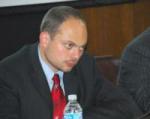

Vladimir Kara Murza
Over the weekend Russia’s opposition held a primary election to pick 45 members of its newly established Coordinating Council, a collective leadership for the anti-Putin protest movement that sprang into national politics last December as tens of thousands of people went to the streets to protest a fraudulent parliamentary poll and demand democratic reforms. The Kremlin tried its best to sabotage the vote: the Investigative Committee opened a criminal case against its organizers, while a coordinated cyber attack disabled the online polling platforms for almost the entire first day of voting. Russia’s current leaders, it seems, are opposed to competitive elections even when they do not threaten them directly—as a matter of principle...................
Despite the regime’s efforts, the vote went ahead: more than 80,000 opposition activists participated in the primaries (the world’s second-largest online vote, after the 2011 Estonian parliamentary election). Those elected to lead Russia’s unified opposition include anticorruption crusader Alexei Navalny, former Deputy Prime Minister Boris Nemtsov, former world chess champion Garry Kasparov, environmental campaigner Yevgenia Chirikova, leftist leader Sergei Udaltsov, author and analyst Andrei Piontkovsky, center-left lawmaker Dmitri Gudkov, and—full disclosure—the author of this column.
One of those elected to the Council is Leonid Razvozzhayev, a member of the Left Front and an assistant to opposition Duma deputy Ilya Ponomarev. He will not, however, be able to take his seat. On October 5th, the pro-Kremlin NTV channel aired a propaganda film that accused Udaltsov and his associates, including Razvozzhayev, of plotting “mass disturbances” in Russia with Georgian lawmaker Givi Targamadze, who supposedly bankrolls the operation. Despite the absurdity of the “accusations” (which included plotting to seize power in Kaliningrad, sabotage the Trans-Siberian Railroad, and set up opposition training camps with Romanian instructors), evident doctoring of the “secret recording,” and a striking dissimilarity between the real Udaltsov and the “Udaltsov” from NTV’s film, the authorities opened a criminal investigation that could land the defendants in prison for up to 10 years.
Udaltsov is being summoned to the Investigative Committee on Friday. His assistant, Konstantin Lebedev, is already under arrest. Razvozzhayev had escaped to Ukraine, where he applied for asylum at the local office of the UN High Commission on Refugees. On October 20th, as he was leaving the UNCHR headquarters in Kiev, he was seized by Russian security officials (without so much as a word of protest from Ukraine’s still supposedly sovereign government), driven to Russia, held incommunicado, and tortured for two days into “confessing” to the “Georgian plot,” incriminating himself and his colleagues.
Andrei Vyshinsky, the chief prosecutor at Stalin’s show trials of the 1930s, famously said that “confession is the queen of all evidence.” This principle has been adopted by his present-day successors—together with “foreign plots” as the basis for prosecution. Without hyperbole, Vladimir Putin is emanating Stalinist methods of crushing dissent—which fits the Kremlin’s apparent objective of “finishing off the protest movement by the New Year.”
What happens next will depend on the opposition’s ability to mount a peaceful counteroffensive in the form of renewed street protests, and to show the Kremlin that a crackdown will only fuel the movement against authoritarian rule. Much will also depend on the position of the international community: in particular, on whether the world’s democracies will finally stand on principle instead of “resetting” their relations with a tyrant.
* Vladimir Kara-Murza's blog
























